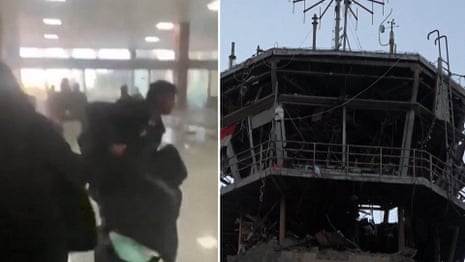Key events
Houthis claim new attacks on Israel after strikes hit Yemen airport
Houthi rebels have claimed responsibility for the overnight firing of a missile at Tel Aviv’s Ben Gurion airport and say they launched drones at Israel’s commercial capital, as well as a ship in the Arabian Sea, according to reports. Here is a report from The Times of Israel, which we have not yet been able to independently verify:
The Houthis claim that “the missile succeeded in reaching its target despite the enemy’s censorship, and the operation resulted in casualties and the cessation of navigation at the airport.”
The IDF said the missile was successfully downed by air defenses, and there were no reports of impacts at the airport. Flight arrivals were reportedly halted for 30 minutes.
Additionally, the Houthis claim to have carried out a drone attack on a “vital target” in the Tel Aviv area. There were no reports of drones reaching Israel from Yemen in the past day.
The Houthis also say that it targeted a container ship in the Arabian Sea with several drones.
As we mentioned in the opening summary, a wave of Israeli airstrikes hit Yemen’s main airport on Thursday just as the World Health Organization’s director-general, Tedros Adhanom Ghebreyesus, said he was about to board a flight there. One of the UN plane’s crew was injured. In an update earlier today, a WHO spokesperson said the injured air crew member, who worked for the UN humanitarian air service, suffered serious injuries but is now recovering in hospital.
Who are the Houthis in Yemen?
The Iran-backed Houthis in Yemen have been attacking commercial shipping in the Red Sea for more than a year to try to enforce a naval blockade on Israel, saying they are acting in solidarity with Palestinians in Israel’s year-long war in Gaza.
The strikes on shipping by the Houthis, who have also launched missiles at Israel, have prompted retaliatory strikes by the US and Britain. Here is an extract from our explainer on the group:
The Houthis are a Yemeni militia group named after their founder, Hussein Badreddin al-Houthi, and representing the Zaidi branch of Shia Islam.
They emerged in the 1980s in opposition to Saudi Arabia’s religious influence in Yemen.
The group, which has an estimated 20,000 fighters and whose official name is Ansar Allah, runs most of the west of the country and is in charge of its Red Sea coastline…
The Houthis had been gaining support around the turn of the century from Shia Yemenis fed up with the corruption and cruelty of the longtime authoritarian president and Saudi ally, Ali Abdullah Saleh, particularly during the aftermath of 9/11 and the US invasion of Iraq. Popular protests and several assassination attempts forced Saleh to resign in 2012.
In 2014 the Houthis allied with their former enemy Saleh to seize the capital, Sana’a, and overthrew the new western-backed president, Abd Rabbu Mansour Hadi, a year later. After Hadi was forced to flee, the exiled Yemeni government asked its allies in Saudi Arabia and the UAE to launch a military campaign, also backed by the west, to drive out the Houthis.
A catastrophic civil war ensued that the UN estimated led to 377,000 deaths and displaced 4 million people by the end of 2021.
The Houthis in effect won the war. An April 2022 ceasefire prompted a significant decline in violence, and fighting has largely remained in abeyance despite the official expiry of the truce in October.
Here are some of the latest images coming out of Yemen following the deadly Israeli airstrikes yesterday:
Netanyahu warns airstrikes on Yemen will continue after WHO chief caught up in deadly attack on Sana’a airport
Welcome back to the Guardian’s live coverage of the Middle East crisis after Israel struck multiple targets linked to the Iran-aligned Houthi movement in Yemen on Thursday, including the international airport in the capital, Sana’a. Houthi media said at least six people were killed.
The head of the World Health Organization, Tedros Adhanom Ghebreyesus, says he was at Yemen’s international airport when it was hit. A crew member on the plane was injured, he said, and at least two people were reported killed at the airport. Tedros said he had been in Yemen to negotiate the release of UN staff detained by the Houthis and assess the humanitarian situation.
The Israeli military said that it also hit military infrastructure at the ports of Hodeidah, Salif and Ras Kanatib on Yemen’s west coast. It also attacked the country’s Hezyaz and Ras Kanatib power stations.
Later on Thursday, the Houthis – which have declared themselves to be part of the Iranian-led “axis of resistance” against Israel – reportedly said they were ready to respond quickly to the attack and meet “escalation with escalation”.
Israeli prime minister Benjamin Netanyahu warned that Israel’s airstrikes would “continue until the job is done”. “We are determined to cut this branch of terrorism from the Iranian axis of evil,” he said in a video statement.
In other developments:
-
The United Nations chief, António Guterres, has denounced the “escalation” in hostilities between Yemen’s Houthi rebels and Israel, calling IDF strikes on targets including at the airport in Sana’a “especially alarming”.
-
The UN security council is due to meet on Monday over the Houthi attacks on Israel, Israel’s UN ambassador Danny Danon has said.
-
Israel’s military intercepted a missile fired from Yemen in the latest attack by Houthi rebels – hours after Israeli military bombed sites in Yemen.
-
Israel’s military has forced dozens of sick and injured patient to leave Kamal Adwan hospital in Beit Lahiya, northern Gaza,Al Jazeera is reporting.






